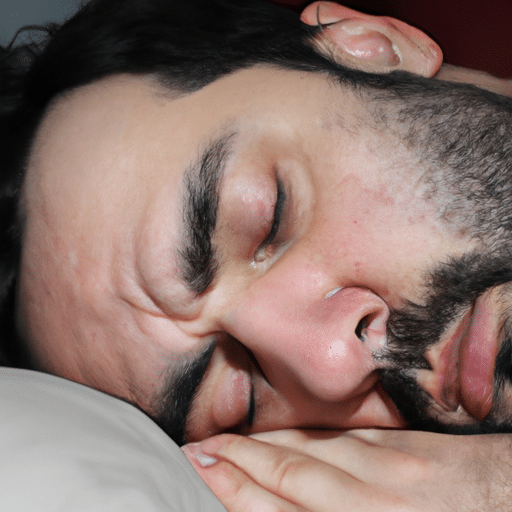Living with chronic pain can be incredibly challenging, impacting various aspects of our everyday lives. However, one area that is severely affected is our sleep. In this article, we will explore the profound impact that chronic pain can have on our ability to get a good night’s rest. From the physical discomfort to the psychological toll, we will delve into the intricate relationship between chronic pain and sleep, uncovering the strategies that can help us find some much-needed relief.
Review contents
Physical and Psychological Factors
Chronic pain can have profound effects on both our physical and psychological well-being. The intensity of pain plays a crucial role in determining how it impacts our sleep. When pain is intense, it becomes difficult to find a comfortable position, which can disrupt our ability to fall asleep or stay asleep throughout the night. Moreover, the duration of pain also affects our sleep. If the pain persists for a long period of time, it can lead to a chronic sleep disturbance, further exacerbating the negative impact on our health.
Pain Intensity
The intensity of pain directly correlates with the level of sleep disturbances experienced. When pain is severe, it becomes challenging to find a comfortable sleeping position. The discomfort experienced hinders our ability to relax and fall asleep easily. Furthermore, the intensity of pain can also cause awakenings during the night, leading to fragmented sleep. This continuous cycle of disrupted sleep can contribute to increased levels of fatigue and heightened pain sensitivity.
Pain Duration
Chronic pain, by definition, lasts for an extended period of time. When pain becomes a constant presence in our lives, it can significantly affect our sleep patterns. Continuous pain disrupts our ability to achieve restorative sleep, leading to a decreased overall sleep duration. This reduction in sleep time can result in daytime sleepiness, fatigue, and impaired cognitive functioning. It is important to address the underlying causes of chronic pain in order to improve sleep quality and duration.
Pain Medications
The use of pain medications can have varying effects on sleep. While some pain medications may help to alleviate pain and promote sleep, others can have unwanted side effects that negatively impact our rest. Opioid medications, for example, can cause daytime drowsiness, reduced sleep quality, and even respiratory disorders during sleep. Therefore, it is essential to work closely with healthcare professionals to find the right balance of pain management medications that minimize sleep disruption.
Psychological Distress
Living with chronic pain can take a toll on our psychological well-being. The distress caused by constant pain can lead to anxiety, depression, and other mood disorders. These psychological factors can further contribute to sleep disturbances, creating a vicious cycle. Anxiety and worry about the pain can make it difficult to relax and fall asleep. Additionally, the emotional distress associated with chronic pain can cause hyperarousal, leading to increased alertness during sleep and difficulty staying asleep through the night.
Sleep Architecture
Understanding sleep architecture is crucial in comprehending how chronic pain affects our sleep. Sleep is divided into different stages, including rapid eye movement (REM) sleep and non-REM (NREM) sleep. The disruption of these sleep stages can occur due to chronic pain, leading to altered sleep architecture. Chronic pain can lead to a decrease in the amount of deep sleep (NREM stage 3) experienced, which is the most restorative stage of sleep. As a result, we may wake up feeling less refreshed and rejuvenated.
Insomnia
Insomnia is a common sleep disorder that can be both a cause and a consequence of chronic pain. The presence of chronic pain can make it difficult to fall asleep, stay asleep, or achieve restorative sleep, leading to insomnia. On the other hand, insomnia itself can increase the sensitivity to pain and worsen the perception of pain intensity. It is essential to address both the chronic pain and insomnia concurrently to break this cycle and achieve better sleep quality.
Obstructive Sleep Apnea
Obstructive sleep apnea (OSA) is another sleep disorder that can be impacted by chronic pain. OSA occurs when the upper airway becomes partially or completely blocked during sleep, leading to pauses in breathing and frequent awakenings. The presence of chronic pain can exacerbate the symptoms of OSA as pain can make it difficult to find a comfortable sleeping position, contributing to airway blockages. Treating the underlying causes of chronic pain can help alleviate the symptoms of OSA and improve sleep quality.
Restless Leg Syndrome
Restless leg syndrome (RLS) is a neurological disorder characterized by an irresistible urge to move the legs, often accompanied by uncomfortable sensations. Chronic pain can worsen the symptoms of RLS, as the discomfort experienced from pain can trigger the urge to move the legs. This constant need to move the legs can disrupt sleep and make it challenging to stay asleep throughout the night. Treating chronic pain can help manage RLS symptoms and promote better sleep quality.
Biological Mechanisms and Sleep Disruption
Several biological mechanisms play a role in the disruption of sleep caused by chronic pain. Neurotransmitters, circadian rhythm, and hormonal imbalances contribute to the sleep disturbances experienced.
Neurotransmitters
Neurotransmitters in the brain, such as serotonin and norepinephrine, play a crucial role in regulating pain perception and sleep. Chronic pain can disrupt the balance of these neurotransmitters, leading to increased pain sensitivity and impaired sleep regulation. Addressing imbalances in neurotransmitters can help alleviate both pain and sleep disturbances.
Circadian Rhythm
Our body’s internal clock, known as the circadian rhythm, regulates our sleep-wake cycle. Chronic pain can disrupt this rhythm, making it difficult to establish a consistent sleep schedule. The constant discomfort and pain can keep us awake at night and make it challenging to fall asleep at regular times. By managing chronic pain and implementing proper sleep hygiene practices, we can help restore a healthy circadian rhythm and improve sleep quality.
Hormonal Imbalances
Hormonal imbalances, such as elevated levels of cortisol (the stress hormone), can contribute to sleep disruptions in individuals with chronic pain. Pain itself can trigger the release of stress hormones in the body, leading to increased alertness and difficulty falling asleep. Chronic pain management techniques, such as stress reduction and relaxation techniques, can help regulate hormonal imbalances and promote better sleep.
Effects on Sleep Quality and Quantity
Chronic pain has a significant impact on the quality and quantity of our sleep. Understanding these effects can shed light on the importance of seeking treatment for both chronic pain and sleep disturbances.
Fragmented Sleep
Chronic pain often leads to fragmented sleep, characterized by multiple awakenings during the night. The discomfort and pain make it challenging to stay asleep, resulting in frequent arousals. Fragmented sleep can further exacerbate the perception of pain, as a lack of continuous and restorative sleep can lead to increased pain sensitivity.
Reduced Total Sleep Time
Chronic pain can significantly reduce the total amount of sleep obtained each night. The pain can make it challenging to fall asleep and stay asleep through the night, leading to overall sleep deprivation. Reduced total sleep time can lead to daytime sleepiness, fatigue, and impaired cognitive functioning. It is important to address chronic pain and improve sleep quality to prevent the negative consequences of sleep deprivation.
Longer Sleep Onset Latency
Sleep onset latency refers to the time it takes for us to fall asleep after getting into bed. Chronic pain often prolongs sleep onset latency, as the discomfort and pain make it difficult to relax and unwind. Long sleep onset latency can result in frustration and anxiety, further perpetuating the cycle of sleep disturbances. Implementing relaxation techniques, such as deep breathing exercises or mindfulness meditation, can help reduce sleep onset latency and promote better sleep.
Alterations in Sleep Stages
Chronic pain can lead to alterations in sleep stages, particularly a decrease in deep sleep (NREM stage 3). Deep sleep is essential for rest and restoration, and a reduction in this stage can result in feeling less refreshed and rejuvenated upon waking. Additionally, chronic pain can disrupt REM sleep, the stage associated with dreaming and cognitive processing. These alterations in sleep stages can lead to increased fatigue and cognitive impairments during the day.
Decreased REM Sleep
REM sleep is important for memory consolidation, emotional regulation, and overall cognitive functioning. Chronic pain can disrupt REM sleep, leading to decreased REM sleep duration and quality. This can impact our ability to process emotions and memories, contributing to emotional disturbances and impaired cognitive functioning. Addressing chronic pain can help restore REM sleep and improve overall sleep quality.
Sleep and Pain Interaction
The relationship between sleep and pain is often cyclical, with each negatively impacting the other. Understanding this interaction is crucial in addressing both chronic pain and sleep disturbances effectively.
Vicious Cycle of Sleep and Pain
Chronic pain can create a vicious cycle of sleep disturbances and increased pain sensitivity. Poor sleep quality and sleep deprivation can lead to increased pain intensity and heightened perception of pain. On the other hand, chronic pain can disrupt sleep, preventing restorative sleep and exacerbating pain sensitivity. Breaking this cycle requires addressing both the underlying causes of chronic pain and implementing strategies to promote better sleep.
Hyperalgesia and Allodynia
Hyperalgesia refers to an increased sensitivity to pain, while allodynia refers to the perception of pain from non-painful stimuli. Chronic pain can lead to both hyperalgesia and allodynia, making sleep more challenging. The discomfort caused by pain can make finding a comfortable sleeping position difficult, and even gentle touch or pressure can be perceived as painful. It is important to manage chronic pain effectively to reduce hyperalgesia and allodynia and improve sleep quality.
Sensitivity to Sleep Disturbance
Chronic pain can increase our sensitivity to sleep disturbances. Even minor disruptions, such as a partner tossing and turning or external noise, can significantly impact our ability to fall and stay asleep. This heightened sensitivity to sleep disturbance can lead to increased frustration, anxiety, and exacerbation of pain intensity. Implementing sleep hygiene practices and creating a sleep-friendly environment can help minimize sleep disturbances and promote better sleep.
Impact on Daily Functioning
The effects of chronic pain on sleep extend beyond nighttime hours and can impact our daily functioning in various ways.
Daytime Sleepiness and Fatigue
Sleep disturbances caused by chronic pain can result in excessive daytime sleepiness and fatigue. The lack of restorative sleep leads to decreased energy levels and a constant feeling of tiredness throughout the day. This can make it difficult to concentrate, perform daily tasks, and engage in social activities. Addressing the underlying causes of chronic pain and improving sleep quality can help alleviate daytime sleepiness and improve overall daily functioning.
Cognitive Impairments
Chronic pain and sleep disturbances can lead to cognitive impairments, including difficulties with memory, attention, and decision-making. Disrupted sleep can impede the brain’s ability to consolidate information and process memories, resulting in impairments in cognitive functioning. This can impact our ability to perform well at work or school and can hinder overall productivity. By addressing chronic pain and improving sleep quality, we can help restore cognitive functioning and optimize daily performance.
Emotional Disturbances
Living with chronic pain and disrupted sleep can take a toll on our emotional well-being. Anxiety, depression, irritability, and heightened emotional reactivity are common emotional disturbances experienced by individuals with chronic pain. These emotional disturbances can further perpetuate sleep disturbances, creating a cycle of poor sleep and negative emotions. Seeking treatment for chronic pain and implementing strategies to promote better sleep can help manage emotional disturbances and improve overall well-being.
Social and Interpersonal Consequences
Chronic pain and sleep disturbances can impact our social and interpersonal relationships. The constant fatigue and pain can limit our ability to participate in social activities, spend quality time with loved ones, and engage in hobbies or interests. This can lead to feelings of isolation, frustration, and even strain on relationships. By addressing chronic pain and improving sleep quality, we can regain the ability to participate in social activities and maintain healthy interpersonal connections.
Sleep Management Strategies for Chronic Pain
Managing both chronic pain and sleep disturbances requires a multidimensional approach, incorporating various strategies to promote better sleep quality.
Pain Management Techniques
Addressing the underlying causes of chronic pain is essential in improving sleep quality. Utilizing pain management techniques, such as medication, physical therapy, or alternative therapies like acupuncture or massage, can help alleviate pain and reduce its impact on sleep. Working closely with healthcare professionals can help develop an individualized pain management plan that addresses both the physical and psychological aspects of chronic pain.
Sleep Hygiene Practices
Implementing good sleep hygiene practices is important in promoting better sleep quality. This includes maintaining a consistent sleep schedule, creating a relaxing sleep environment, avoiding stimulants close to bedtime, and establishing a bedtime routine that promotes relaxation. Prioritizing sleep and creating a conducive sleep environment can significantly improve sleep quality and duration.
Pharmacological Interventions
In some cases, pharmacological interventions may be necessary to manage chronic pain and sleep disturbances. Certain medications can help alleviate pain, reduce sleep disturbances, and promote better sleep quality. However, it is essential to work closely with healthcare professionals to determine the most appropriate medications, considering the potential side effects and interactions with other medications.
Cognitive Behavioral Therapy for Insomnia (CBT-I)
Cognitive Behavioral Therapy for Insomnia (CBT-I) is a proven effective treatment for both insomnia and chronic pain. CBT-I focuses on modifying negative thoughts and behaviors associated with sleep and pain, promoting relaxation techniques, and developing healthy sleep habits. By addressing both the mental and physical aspects of sleep disturbances and chronic pain, CBT-I can help break the cycle of poor sleep and pain, leading to improved sleep quality.
Alternative Therapies
Alternative therapies, such as acupuncture, yoga, mindfulness meditation, and relaxation techniques, can complement traditional methods of managing chronic pain and sleep disturbances. These therapies aim to reduce pain, promote relaxation, and improve overall well-being. Incorporating alternative therapies into a comprehensive treatment plan can provide additional relief and enhance the benefits of other sleep management strategies.
Importance of Seeking Treatment
Recognizing the importance of seeking treatment for chronic pain and sleep disturbances is crucial in improving overall quality of life.
Multidisciplinary Approach
Managing chronic pain and sleep disturbances often requires a multidisciplinary approach, involving healthcare professionals from various disciplines. This may include physicians, pain specialists, psychologists, sleep specialists, and physical therapists. Working collaboratively, these professionals can develop an individualized treatment plan that addresses both the physical and psychological aspects of chronic pain and sleep disturbances.
Improving Quality of Life
Seeking treatment for chronic pain and sleep disturbances can significantly improve our quality of life. By managing pain effectively and improving sleep quality, we can experience reduced pain intensity, increased energy levels, enhanced cognitive functioning, and improved emotional well-being. This allows us to engage in daily activities, enjoy social interactions, and maintain a fulfilling and meaningful life.
Preventing Sleep and Pain Reciprocal Relationship
Breaking the cycle of sleep disturbances and chronic pain is crucial in preventing the reciprocal relationship between the two. By addressing both chronic pain and sleep disturbances concurrently, we can reduce pain sensitivity, improve sleep quality, and prevent the negative consequences of poor sleep on pain perception. Seeking treatment early and implementing appropriate sleep management strategies can help break the cycle and promote long-term well-being.
Conclusion
Chronic pain significantly impacts our sleep, leading to a range of physical, psychological, and social consequences. Understanding the factors that contribute to sleep disturbances in individuals with chronic pain is essential in implementing effective sleep management strategies. By addressing the underlying causes of chronic pain, utilizing pain management techniques, and prioritizing good sleep hygiene practices, we can break the cycle of sleep disturbances and pain and improve our overall well-being. Seeking treatment for chronic pain and sleep disturbances is essential in enhancing our quality of life and promoting optimal physical and psychological health.



























